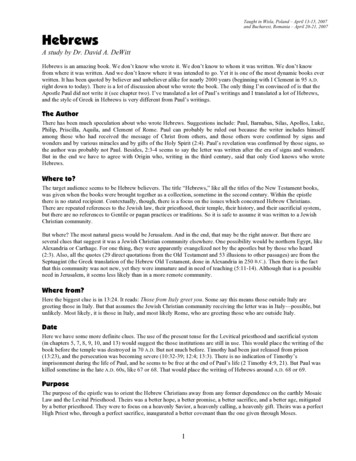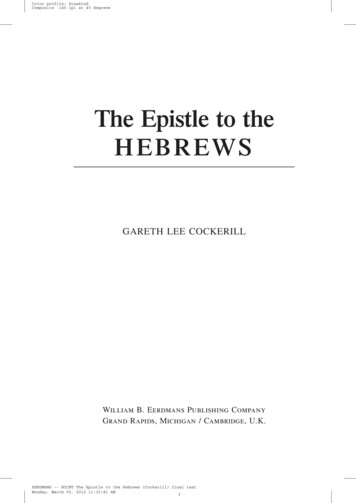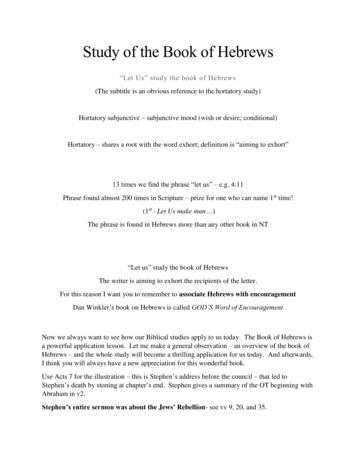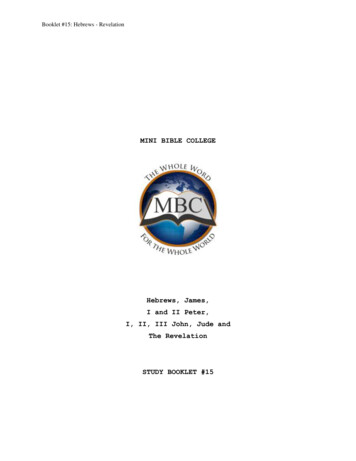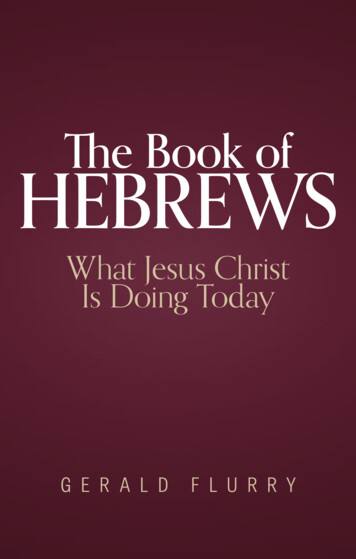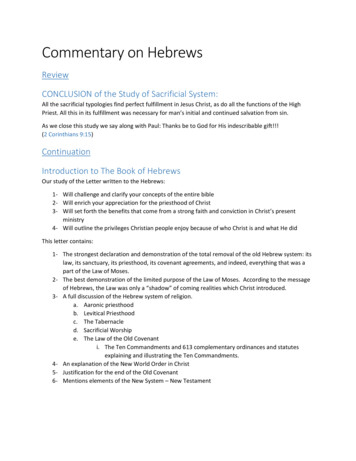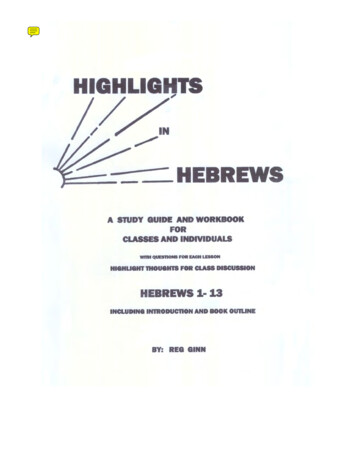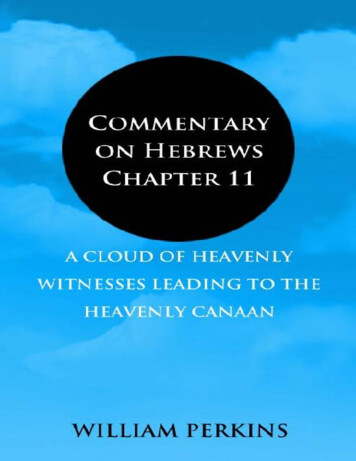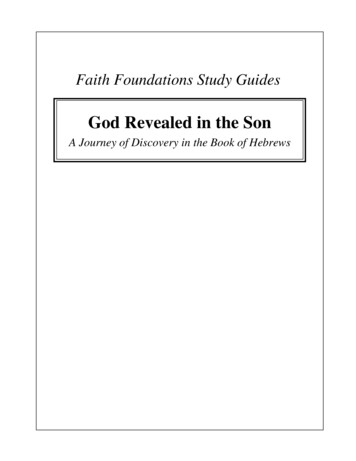
Transcription
BOOK 1 LESSONS 1-13P E R S O N A L ST U DY G U I D EHEBREWSJ E S U SI SB E T T E R
HEBREWSJ E S U SI SB E T T E RP E R S O N A L ST U DY G U I D ES U N D AY S C H O O L B O O K 1 L E S S O N S 1 - 1 3Dr. Daniel Hinton, author
a letter from Ste ven W. Sm it h , Ph DJESUS IS BETTER.Jesus loves me! This I know, for the Bible tells me so.There is quite a bit of good theology in that lyric. The love of Jesusis affirmed, while holding a high view of the Scriptures. This isenough for a child to get started. It is beautiful in its simplicity.It would in fact be quite enough, but there is more so muchmore to who Jesus is. We start there, but we do not stopthere because Scripture does not stop there.Having a simple faith is a virtue but being simple minded isa vice. Therefore, Scripture gloriously leads us to love Jesusby a deepening appreciation for His nature and His work.When we see Him closely, we see that Jesus is better.Jesus is better.He is superior to the Old Testament prophets that lead to him. He issuperior to the angels. He is superior to the temple and to the old ways ofthinking about salvation. He is so much better.Because of His superiority we are drawn to Him. This superiority is also a call to beware. If He is superior and weneglect His word or His message, then there is no hope for us.HebrewsThe book of Hebrews toggles between passages that exalt the name of Christ and passages that warn us. We arecalled to see Jesus above all else, and we are warned about the folly of rejecting Him.This next year we will celebrate the fact that Jesus is better than anything else in life. We will also encourage oneanother not to drift away from the faith. We will heed the warnings provided in the book. My prayer is that ourchurch will love Jesus more deeply with a richer appreciation of who Jesus is and what He has done for us. Jesusis the pinnacle of God’s plan for us. He is at the top and all else is in His shadow. May God give us eyes to seeHim in 2019!Blessings on your new year!Steven Smith, Senior Pastor
TABL E OF CO N T E N TSP E R S O N A L ST U DY G U I D E6LESSON 1Introduction to Hebrews14LESSON 2Jesus is Better 1 (1:1-4)22LESSON 3Jesus is Better 2 (1:5-14)32LESSON 4Drift (2:1-4)40LESSON 5The Plan, Part 1 (2:5-9)48LESSON 6The Plan, Part 2 (2:10-18)58LESSON 7Jesus is Faithful (3:1-6)66LESSON 8A Warning to Believe (3:7-19)76LESSON 9Let us Fear (4:1-11)84LESSON 10Saved by the Word (4:10-13)92LESSON 11The Greater Priest (5:1-10)100LESSON 12Warning, Part 1 (5:11-14)110LESSON 13Warning, Part 2 (6:1-8)
LESSON 1I N T R O D U C T I O NT OHEBREWSHISTORICAL CONTEXT: REFERENCE GUIDEIntroduction & Context6 Scholars place the writing of Hebrews between 50 and 96 AD. Of course this is quite alarge date range. When considering the historical context, references to various biblical andhistorical events and figures, some have suggested it was written in the early 60’s just beforethe escalation of tension between Judea and Rome in the mid 60’s. The authorship for the book of Hebrews remains contested. Barnabas, Paul, Luke, Apollos,Phillip, and evidently as many as 8-10 others have been claimed by scholars as the authorof Hebrews. This debate originated during the time of the early church and has enduredthrough modern scholarship. During our study of Hebrews, we will suggest that in fact Lukeis the author of Hebrews. For more on the support for this, see "AUTHORSHIP: Why Luke?” “Establishing the historical setting for Hebrews involves at least four issues: the spreadof Christianity to Rome, the Jewish people in Rome, the emperor Nero and the Jewishpeople in Rome, and finally Judea during A.D. 60s. All four play a role in understanding,interpreting, and applying the letter to the Hebrews for today’s readers, teachers, andpreachers of the book.”1HEBREWS Personal Study Guide Book 1
LESSON 1READ REVIEW REFLECT RESPONDLITERARY CONTEXT: REFERENCE GUIDETracing the MessageI. PREVAILING THEMESa. Endurance- believers must persevere in their faith as they grow in Christ-likenessb. Jesus as Son- Jesus is one with the Father, a member of the Holy Trinity.c. Jesus as Ruler- Jesus is enthroned, ruling over the earthd. Jesus as High Priest- Jesus came to make ultimate atonement for sin and he intercedes onbehalf of believers.e. Apostacy- turning away, walking away from God, or failing to hold fast to faithII. THE USE OF THE OLD TESTAMENT2The author relies heavily on the Old Testament to build his message. This is one reasonscholars believe this reads more like a “midrash” (see Literary Structure and Elements), as anexplanation of the Old Testament. One commentator suggests that approximately 18% ofthe total words of Hebrews are direct references to the OT. This does not include the manyother indirect references.DIRECT Old TestamentQuotation1:5Ps 2:72 Sam. 7:14Deut. 32:43Ps. 104:4Ps. 45:6-7Ps. 102:25-27Ps. 110:1Ps. 8:4-6Ps. 22:22Isa. 8:17-18Ps. 95:7-11Ps. 95:7-84:3, 54:44:75:55:66:147:17, 218:58:8-129:2010:5-910:16-17Ps. 95:11Gen. 2:2Ps. 95:7-8Ps. 2:7Ps. 110:4Gen. 22:17Ps. 110:4Exod. 25:40Jer. 31:31-34Exod. 24:8Ps. 40:6-8Jer. 31:33-3410:30Deut. 32:35Deut. 32:38Ps. 135:14Hab. 2:3-4Gen. 21:12Prov. 3:11-12Exod. 19:12-13Deut. 9:19Hag. 2:6Deut. 4:24Deut. 31:6Ps. nal Study Guide ibclr.org HEBREWS7
LESSON 1READ REVIEW REFLECT RESPONDIII. LITERARY STRUCTURE & ELEMENTS3A MIDRASHThe term midrash (çrdm) comes from darash (çrd) which means “tosearch,” “to seek,” “to examine,” “to investigate.” For some midrashis: (1) literature about the Bible, that is, a literature on literature; (2)literature that attempts to make Scripture understandable, useful, andrelevant for a later generation; and (3) literature that is predominantlycreative in its handling of biblical material. For others, midrash is anindefinable Jewish way of thinking and interpreting Scripture thatutilizes whatever methods needed so that Scripture remains a living,breathing book relevant for everyday life.Yet it seems more appropriate to define midrash as both a literarygenre and exegetical process.A LETTERHebrews has at least two affinities with epistolary literature.First, Hebrews makes several personal allusions to the readers.Second, Hebrews has a typical Greco–Roman postscript. It concludeswith a benediction (13:20), personal remarks (13:22-24), and afarewell (13:25). Yet the lack of a prescript is problematic. GrecoRoman letters tend to include: a salutation, sender, and addressees.Finally, it’s been argued that “The author’s concluding remark, ‘I havewritten to you briefly’ (13:22), does not necessarily imply that thewriting should be classified as a letter in the strict sense” (Holladay,2017, 698; cf. Trudinger, 1972, 128-30).Nevertheless, there is no escaping the fact that Hebrews hascharacteristics of an ancient Greco-Roman letter.A SERMONFirst advocated by J. Berger in 1797, those who hold the homily viewsuggest that Hebrews has several affinities with first century homilies.IV. AUTHORSHIP: Why Luke?For the purposes of this study, the sermons nor the curriculum will make a dogmatic case forauthorship. We recognize the various strong arguments from capable scholars. Dr. Smithaligns with Dr. David Allen in suggesting that Luke is the author of Hebrews, or that perhapsPaul is the author, using Luke as his scribe. Some in the early church attributed Hebrews toLuke. Scholars have also observed some linguistic similarities between Hebrews and Luke/Acts. And some make the case that Luke was in fact Jewish, making him a suitable candidateto write something with such Jewish content.48HEBREWS Personal Study Guide Book 1
LESSON 1READ REVIEW REFLECT RESPONDV. AUDIENCE: Why ‘Jewish Christians’?“Admittedly, the recipients of Hebrews could be one of three possibilities: (1) a mixedgroup of Jew and Gentile Christians , (2) Gentile Christians, or (3) Jewish Christians. Mostcommentators, however, ascribe the recipients of Hebrews to be Jewish Christians. Initialsupport for the Jewish Christian perspective began with Clement of Alexandria circa A.D.180, Tertullian circa A.D. 220, and Jerome in A.D. 419 or 420. Yet “to the Hebrews” (πρὸςἙβραιους) can be understood simply as a way to distinguish Jews from Gentiles. Or it canbe descriptive for Jewish people of Judea in contrast to the Jewish people of the diaspora(Acts 6:1). So the real debate here concerns whether the recipients of Hebrews were JewishChristians who lived in Judea or to the Hellenistic Jewish Christians who lived somewhere inthe Roman Empire, presumably Rome.”5VI. THE MESSAGE OF HEBREWS6 (Chuck Swindoll)“Hebrews clearly lays out the present priestly ministry of Christ in the life of the believer.Jesus is both the divine Son of God and completely human, and in His priestly role He clearsthe way for human beings to approach the Father in heaven through prayer (Hebrews 4:14–16). The priesthood of Jesus is superior to the Old Testament priesthood of Aaron, becauseonly through Jesus do we receive eternal salvation (5:1–9). Furthermore, Jesus became thepermanent and perfect High Priest, going beyond all other priests by offering Himself as asinless sacrifice on behalf of the sins of human beings (7:24–26; 9:28).Throughout its pages, Hebrews makes clear that Jesus Christ exceeds all other people,pursuits, objects, or hopes to which human beings offer allegiance. Hebrews pictures Jesusas better than the angels, as bringing better lives to humanity through salvation, as offering abetter hope than the Mosaic Law could promise, as a better sacrifice for our sins than a bull ora goat, and as providing a better inheritance in heaven for those who place their faith in Him(Hebrews 1:4; 6:9; 7:19; 9:23; 10:34). Jesus is indeed superior to all others.This message of the superiority of Jesus would have been particularly important to JewishChristians in Rome, who were struggling under Nero’s persecution and were consideringmoving back toward the Mosaic Law. The writer to the Hebrews showed these Jewish Christianbelievers that, though they were faced with suffering, they were indeed following a better way. . . and they should persevere.”“And to thispersecuted sufferinggroup of Jewishbelievers andunbelievers, he writesto reveal the meritsof Jesus Christ andthe new covenant asopposed to the oldcovenant.”-John MacarthurPersonal Study Guide ibclr.org HEBREWS9
LESSON 1READ REVIEW REFLECT RESPONDREDEMP TIVE CONTEXT: REFERENCE GUIDEHEBREWS IN REDEMPTIVE CONTEXTScholars believe that Hebrews was written after the death, burial, resurrection, and ascension ofChrist during the time of the early church. Take a moment to walk students through some of ourmost recent studies.God Story (Spring 2018): Remind the students that the Bible tells one overarching narrative.Psalms (Summer 2018): Remind the students about the era of the Kings, before the Kingdomsplit, when David wrote many of the Psalms.Nehemiah (Spring 2018) : Remind the students where we were in the storyline when we walkedthrough Nehemiah. During the exile, Nehemiah was granted permission by Artaxerxes, a foreignruler to return and rebuild Jerusalem.Lamentations (Fall 2018): What did we just finish? Well, we have moved backward chronologically.It may be helpful to think of it this way. Remember when Nehemiah and God’s people joinedtogether to rebuild the walls, and re-devote their lives to faithfulness? Rewind the story backwardto when the city was first destroyed. This is when Lamentations is written. This is the beauty ofthe Bible. As disciples of Christ and students of the Word, we can read Lamentations throughthe lens of Nehemiah. We know what happens next in redemptive history. Jeremiah lamentsand rightfully so. And not too long after, Nehemiah weeps for the city, repents on behalf of thepeople and God uses him to do a tremendous work.Christ Exalted: Christmas Hymns (Winter 2018): O Come Thou Long Expected Jesus.O Come, O Come, Emmanuel, and ransom captive Israel, that mourns in lonely exile here.Christ came to earth to become the ultimate rescuer from the ultimate exile. God, who isfaithful to his word, sent Jesus as a ransom for the sins of the world.10HEBREWS Personal Study Guide Book 1
LESSON 1READ REVIEW REFLECT RESPONDHebrews (Spring 2019): It may feel refreshing to you to be back in the sometimes-more-familiarpages of the New Testament. How will the early church carry the name of Jesus to the nations?How will this newly formed Church endure persecution? How will God instruct his people toconduct themselves?HEBREWS AMONG THE OTHER EPISTLESRemember that the New Testament consists of 5 historical books, 21 epistles (letters) and 1prophetic book. In terms of genre, it is important to remember that the first five books of theNT are historical. They tell a story. The middle 21 books are instructive letters. They do not tella story. Rather, they provide doctrine, instruction, rebuke, and inspiration to the churches. Paul’sletters are typically titled in the Bible using the recipient (i.e, Romans, Corinthians, Galatians).The General Epistles (non-Pauline) are titled using the author (i.e, James, Peter, John). Since theauthorship of Hebrews is unknown, it is typically placed as one of the General Epistles, althoughit is titled for its recipients, the Hebrews. Of course some scholars prefer to list Hebrews underthe authorship of Paul, giving Paul 14 letters.THE BOOKS OF THE NEW TESTAMENTHistorical BooksEpistles (Letters)Pauline EpistlesNon-Pauline EpistlesMatthewRomansHebrewsMark1 CorinthiansJamesLuke2 Corinthians1 & 2 PeterJohnGalatians1, 2 & 3 JohnEphesiansJudeActsProphetic BooksRevelationPhilippiansColossians1 & 2 Thessalonians1 & 2 TimothyTitusPhilemonPersonal Study Guide ibclr.org HEBREWS11
LESSON 1READ REVIEW REFLECT RESPONDWHO IS JESUS?H.B. CHARLES, JR.Persecution tempted the readers of this letter to forsake Christ and return to Judaism. Thewriter exhorts the troubled church to continue in the faith because of the superiority ofChrist. What they have in Jesus is infinitely better than they had in Judaism. But Hebrews13:8 makes it clear that the bottom-line is trust, not theology. Doctrine is essential to faith.You are what you believe. But faith is more than knowledge and assent. It is trust in aperson, not agreement with a creed. Christianity is Christ and Christ is God. Nothing elsematters if Jesus is not who he claims to be.712HEBREWS Personal Study Guide Book 1
READ REVIEW REFLECT RESPONDLESSON 1SOURCES1 Commentary on Hebrews. Bateman, Herbert, and Smith, Steven in Kerux: An Integrative Commentary for ProclamationNew Testament Grand Rapids: Kregel, 2020. p.102 Bateman & Smith,. p.19-203 Bateman provides scholarly sources on these views on p.17-20. Descriptions in the cited chart are taken directly fromBateman & Smith,. p.17-204 For more on Luke as the author of Hebrews, see Dr. Allen’s work, Lukan Authorship of Hebrews, NAC Studies inBible and Theology 8. Nashville: Broadman & Holman, 2010. For a brief review of this work, visit an-authorship-of-hebrews5 Bateman & Smith,. p.76 l-epistles/hebrews7 03/The-Changeless-Christ- -SBC-Pastors-Conference-2015.pdfPersonal Study Guide ibclr.org HEBREWS13
LESSON 2JESUS IS BETTER 1HEBREWSw READ THE TEXTToday’s Text: Hebrews 1:1-41 Long ago, at many times and in many ways, God spoke to our fathers by the prophets,2 butin these last days he has spoken to us by his Son, whom he appointed the heir of all things,through whom also he created the world. 3 He is the radiance of the glory of God and theexact imprint of his nature, and he upholds the universe by the word of his power. After makingpurification for sins, he sat down at the right hand of the Majesty on high, 4 having become asmuch superior to angels as the name he has inherited is more excellent than theirs.14HEBREWS Personal Study Guide Book 1
LESSON 2READ REVIEW REFLECT RESPONDk REVIEW THE TEXTCONTENT(1) God speaks.God is a God who speaks. He is a God of revelation. He shows himself to his creation. In thisearliest part of Hebrews, the author will focus on Jesus, who he is, how he relates to the Fatherand what his function is within the Trinity. Pay careful attention to the way the author begins.“Long ago, at many times and in many ways, God spoke to our fathers by the prophets ” Theauthor is likely Jewish and is clearly addressing a Jewish audience. “Our fathers,” he says. Inthe Old Testament God spoke in various ways though his prophets. The author seeks to drawthe distinction between “then” and “now.” God spoke through the prophets, but now Godis speaking through his Son. Our God is a God who speaks and he still speaks. But in thecontext, the author is not referring to God’s verbal revelation. He is referring to the revelationof Himself, his character, his nature, through Jesus.What does it mean that Jesus is the supreme revelation?(2) God speaks through Jesus, the Creator.So God speaks. He spoke in the past through the prophets. But now (in the New Covenant)he speaks through Jesus. The author describes Jesus as the one “through whom” God createdthe world. The one who came to earth to reveal and carry forth God’s plan of redemption forthe world was the Creator himself.“These last days” is a reference to the end times, but also to the first coming of Christ whichset into motion the “last days.”“Think about this, ifthe distance betweenthe earth and the sun(92 million miles) wasthe thickness of onesheet of paper, thenthe distance from theearth to the neareststar would be a stackof paper 70 feet high.And the diameter ofour galaxy would bea stack of paper 310miles high. Our galaxyis only a speck of dustin the universe, andif there is a personwho holds all thattogether by the wordof his power. is thisthe kind of personyou ask into your lifeto be your personalassistant?”- Elisabeth Elliot(3) God speaks through Jesus, the Sustainer.The one who came to reveal and carry forth God’s plan of redemption was the one who“upholds the universe by the word of his power.” Jesus was present and active in Creation.And here, Jesus is the sustainer of the universe. He created all things and he sustains all things.The author is describing the inescapable reality that Jesus is God. Jesus is one with the Father.Personal Study Guide ibclr.org HEBREWS15
LESSON 2READ REVIEW REFLECT RESPONDHow does Jesus hold all things together?Colossians 1:15-17“Nature reveals theexistence, power, andwisdom of God; butnature cannot revealthe very essence ofGod to us. It is onlyin Jesus Christ thatthe invisible God isrevealed perfectly.”-Warren Wiersbe15 He is the image of the invisible God, the firstborn of all creation. 16 For by him all thingswere created, in heaven and on earth, visible and invisible, whether thrones or dominions orrulers or authorities—all things were created through him and for him. 17 And he is before allthings, and in him all things hold together.(4) God speaks through Jesus, the Savior.Jesus, the creator and sustainer is also the one who became our Savior as he “made purificationfor sin.” By way of his death on the cross, he became the atoning sacrifice, the just penalty paidfor the sins of the world.What do you think of this thorough depiction of Jesus? What do you suppose theauthor wants the reader to know early on in Hebrews?Romans 3:23-2623 for all have sinned and fall short of the glory of God, 24 and are justified by his grace as agift, through the redemption that is in Christ Jesus, 25 whom God put forward as a propitiationby his blood, to be received by faith. This was to show God's righteousness, because in hisdivine forbearance he had passed over former sins. 26 It was to show his righteousness at thepresent time, so that he might be just and the justifier of the one who has faith in Jesus.(5) God speaks through Jesus, the Sovereign.Jesus, the Creator, the Sustainer, the Savior sits at the right hand of the Father. He has beengranted this high position because of who he is. He stands alone as sovereign. No man orangel can exist in the same divine position as Jesus. The author highlights Jesus’s majesty,holiness, and grandness by positioning him high above all others, even the angels. God isspeaking to the world through his Son, the Creator of the world. He is speaking to the worldthrough his Son, the one who holds all things together. He is speaking to the world throughJesus, the one who came to earth to offer himself as a ransom for the sins of the world. God isspeaking to the world through Jesus, who He raised from the dead and seated at his right handand gave him the name which is above all names.16HEBREWS Personal Study Guide Book 1
LESSON 2READ REVIEW REFLECT RESPONDPhilippians 2:9-11Therefore God has highly exalted him and bestowed on him the name that is above every name,10 so that at the name of Jesus every knee should bow, in heaven and on earth and under theearth,11 and every tongue confess that Jesus Christ is Lord, to the glory of God the Father.CONCLUSIONGod speaks through Jesus, His Son.r R EFL EC T ON THE TEXT(1) When you think of Jesus, do you tend to think of a certain characteristic of Jesus?When you think of Jesus, do you picture the pre-crucified Jesus healing the sick andpreaching in Galilee? Do you picture him on the cross? Do you picture him in heavenlooking down upon the earth? Why do you suppose you picture Jesus this way?“The Son came. Theykilled Him. Then Heresurrected. It’s onething to knock Himoff and shut Him up.But when He getsback from the dead,and you still ignoreHim, that goes fromstubbornness toinsanity.” -J.D. Greear(2) What do you suppose it means that God speaks through Jesus? It almost soundsas if God used to speak through prophets, but now we must lie in bed listening forthe audible voice of Jesus and not for the voices of prophets. What does it meanthat God speaks to the world through Jesus?(3) If God is speaking through Jesus, what does this mean for mankind?Personal Study Guide ibclr.org HEBREWS17
LESSON 2READ REVIEW REFLECT RESPONDGetting To The Heart. One of the looming questions for every human heart is, “Who canI trust?” “Where can I go when it seems no one can help carry my burdens?” “When thedepths of my heart are exposed, who will love and accept me?” The author of Hebrewsanswers these questions with a resounding, “Look to Jesus.” We can run to Jesus with ourdeepest pain for he holds the universe in his hand. We can have peace in the storm becauseJesus entered the storm to make a way for us. We are not alone in the emptiness and pain ofthis world. Take heart. Jesus has overcome the world. And he sits at the right hand of theFather. He is supreme. He holds the name that is above every name. And so, YES. Yes wecan trust him. Yes he is ever-present with his church. Yes he will return. Yes he will make allthings new. Yes he is faithful to carry us to the other side. Yes we will reign with him in glory.This is Jesus. He is greater.HOME 22:6SING Check out “The Word of God” by Seeds Family Series/136097?episode 1READ Colossians 1PRAY Thank God for revealing himself in the ultimate way by sending Jesus.18HEBREWS Personal Study Guide Book 1
READ REVIEW REFLECT RESPONDLESSON 2Personal Study Guide ibclr.org HEBREWS19
LESSON 3JESUS IS BETTER 2HEBREWSw READ THE TEXTToday’s Text: Hebrews 1:5-115 For to which of the angels did God ever say,“You are my Son,today I have begotten you”?Or again,“I will be to him a father,and he shall be to me a son”?6 And again, when he brings the firstborn into the world, he says,“Let all God's angels worship him.”7 Of the angels he says,“He makes his angels winds,and his ministers a flame of fire.”8 But of the Son he says,“Your throne, O God, is forever and ever,the scepter of uprightness is the scepter of your kingdom.9 You have loved righteousness and hated wickedness;therefore God, your God, has anointed youwith the oil of gladness beyond your companions.”10 And,“You, Lord, laid the foundation of the earth in the beginning,and the heavens are the work of your hands;20HEBREWS Personal Study Guide Book 1
LESSON 3READ REVIEW REFLECT RESPOND11 they will perish, but you remain;they will all wear out like a garment,12 like a robe you will roll them up,like a garment they will be changed.But you are the same,and your years will have no end.”13 And to which of the angels has he ever said,“Sit at my right handuntil I make your enemies a footstool for your feet”?14 Are they not all ministering spirits sent out to serve for the sake of those who are to inheritsalvation?k REVIEW THE TEXTCONTENTEvidently one of the dangerous false teachings of the day involved demoting Jesus to thestatus of angels. It is quite clear that the author of Hebrews wants to begin this letter byascribing maximum and rightful glory to Jesus. In this case, he will use the Old Testament ashis evidence.(1) Jesus is God’s SonJesus was not created like the angels were. He is God’s Son. The author reminds his readersthat the Old Testament language shows a clear distinction between Jesus and angels. DoesGod call angels his Son? No.5 For to which of the angels did God ever say,“You are my Son,today I have begotten you”?Or again,“I will be to him a father,and he shall be to me a son”?The author quotes here from Psalm 2 and 2 Samuel 7.While the language of the New Testament at times suggests that Jesus became God’s son, werecognize that Jesus has existed eternally with the Father and the Spirit. He has always been adivine member of the Trinity. And yet he fulfilled his role of Son within the Trinity by taking onflesh during a specific moment in history.What does it matter if Jesus is merely an angel?Personal Study Guide ibclr.org HEBREWS21
LESSON 3“As strange andsupernatural andencouraging andawe-inspiring asangels may be incarrying out theorders and commandsof God; as helpfuland strengtheningand edifying as theirministry undoubtedlyproves to be, Jesus isbetter!” -Sam StormsREAD REVIEW REFLECT RESPONDLet’s think for a moment of a modern example of a distortion of Jesus. In the early 2000’sresearchers identified the spiritual identity of American teens by coining the term MoralTherapeutic Deism. They suggest the guiding beliefs of American teenagers are:1. A god exists who created and orders the world and watches over life on earth.2. God wants people to be good, nice, and fair to each other, as taught in the Bible and bymost world religions.3. The central goal of life is to be happy and to feel good about oneself.4. God is not involved in my life except when I need God to resolve a problem.5. Good people go to heaven when they die.1At Immanuel, we have been blessed to have Dr. Richard Ross with us to comment on thisphenomenon. He suggests that this type of young person sees Jesus as a mystical type offigurine who can be tucked away in one’s pocket, called upon in particularly challenging timesin life and then put back when the crisis is over.What does it matter if a young person has this distorted view of Jesus?What is the remedy for this type of poor understanding of Jesus?“Do notunderestimateJesus becausethere's nothing thatcompares with Jesus,not even Michael thearchangel, not evenGabriel, not even allthe angels combined.None of themcompare to Jesus.”-Ligon Duncan22We must present Jesus the way the Bible does. We must demonstrate that Jesus is divine.The creator of the universe. On a plane of his own. Majestic beyond full comprehension. Theowner of all authority. This is precisely what the author does here in Hebrews. It is as if he asks,“Do you know who Jesus really is? Well let me tell you. He is far superior than an angel.” Inthe same way, we proclaim to our friends and colleagues who have a distorted view of Jesus.“Do you know who Jesus really is? Well let me tell you. He is far more than a magic eight ball.He is worth far more than your half-hearted devotion to him.”(2) The angels are to worship Jesus.6 And again, when he brings the firstborn into the world, he says,“Let all God's angels worship him.”And why should they worship Him? Because he rules on the eternal throne. Because he is theperfectly righteous one. Because he is the creator of the heavens and the earth. Because heis invincible, indestructible. Because he never changes. And because he sits with all authorityat the right hand of the Father. None of this can be said of the angels. So the angels ought tobow to the Son of God. But, in contrast:HEBREWS Personal Study Guide Book 1
LESSON 3READ REVIEW REFLECT RESPOND7 Of the angels he says,“He makes his angels winds,and his ministers a flame of fire.”And add to this v14. “Are they not all ministering spirits sent out to serve for the sake of thosewho are to inherit salvation?” Here the author draws the distinction between serving andreigning. Jesus reigns. He is the author of salvation. Angels, in a subordinate way, serve themission of the King by assisting in the purposes of the King.AngelsJesusNot sons of God (v5)Rules on eternal throne (v8)Not worshipped like Jesus (v6)Oil of gladness (righteousness) (v9)Ministers (v7)Creator of Heaven/Earth (v10)Eternal/Indestructible (v11)Unchanging (v12)Seated at right hand (v13)The Old Testament Case For Jesus’ SuperiorityHebrews’ Old Testament ReferenceFound in HebrewsPsalm 2:7Hebrews 1:5a2 Samuel 7:14Hebrews 1:5bPsalm 97:7 / Deuteronomy 32:43Hebrews 1:6Psalm 104:4Hebrews 1:7Palm 45:6-7Hebrews 1:8-9Psalm 102:25-27Hebrews 1:10-12Psalm 110Hebrews 1:12“As we share ourfaith, may we do sowith the winsomeconfidence that
A LETTER Hebrews has at least two affinities with epistolary literature. First, Hebrews makes several personal allusions to the readers. Second, Hebrews has a typical Greco–Roman postscript. It concludes with a benediction (13:20), personal remarks (13:22-24), and a farewell (1
